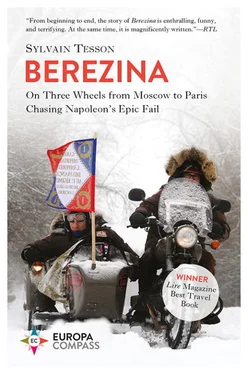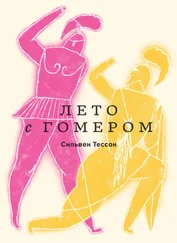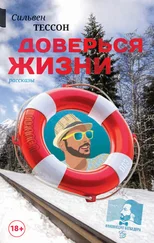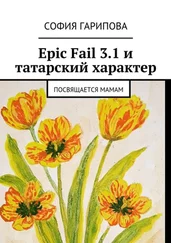At times, his confidences would lapse into pure self-apology. He would grant himself mountains of laurels. “France,” Caulaincourt writes, “owed him codes that would be the making of her glory.” It’s hard to imagine that Napoleon didn’t know that his Grand Squire was secretly writing down his monologues, and that these pages would one day help build generations: “Under my government […] there are no bribes, the cash boxes are watched, […] taxes go where they are intended. […] Who shouts in France? […] The bulk of the nation is righteous.” And he would complete the extolling of his own virtues in a booming voice: “Nobody is less preoccupied with what is personal to him than I.”
And this long monologue, which Caulaincourt would interrupt with timid assents, was interspersed with self-persuasion sessions aimed at concealing the disaster of the campaign from himself: “A well stocked Wilna will put everything back in order.”
Meanwhile, Paris drew nearer with strong lashes of the horsewhip.
Our crossing of the Rhine was more laborious and less romantic than that of the Emperor. He had crossed on board a boat kept by Count Anatole de Montesquiou-Fezensac. We just had a bridge, but still had trouble finding it in the Frankfurt web of highways, next to which the Ruhr interchange looked like neighboring byway crossroads. In the middle of the night, we drove another fifty miles and, our eyes sore from tiredness, when we approached the small town of Bad Kreuznach, we decided it was time to put a stop to our outing before a roadside tree did it for us.
DAY TWELVE.
FROM BAD KREUZNACH TO REIMS
Nothing predisposed the day to a struggle. We had reached a mild latitude, and were due to enter France today. Things promised to be more pleasant than on the Smolensk bypass. On the breakfast table of the Bad Kreuznach inn, we had pushed away the strudel to make room for our map. Because I love looking at an atlas more than anything else, I thought strategists must have a brilliant job. They spend their lives bending over maps, sticking pins and drawing arrows, and take offense if the movement of troops doesn’t follow their plans.
“Where did Napoleon go through?” Vassily asked.
I pointed at the Mainz-Saarbrücken line. “After Mainz, they sped up again. They stopped only to grease the axles. They headed south-west as far as Saint-Avold and Verdun. Then Harville, la Ferté-sous-Jouarre, Château-Thierry and Meaux.”
“Sylvain,” Vitaly said.
“What?”
“Do us a favor.”
“Go on.”
“A small infringement to the sleigh route.”
“And go where?” I said.
“We’d like to go a little farther north, through Luxembourg, Belgium, and the Ardennes. We’ll catch up with the historical route just below Reims.”
“You really want to do that?”
He traced with his finger an itinerary that went around the Woëvre through the north.
“If we do this, we’ll cross four countries in sixty-two miles!”
“So?”
“We’ll be madly popular when we talk about this in Russia.”
Russia, where you could spend ten days on a train before crossing a border…
We therefore headed toward the Duchy of Baroque and banks. The forests were purple, the landscape silky. Humidity made the hills smooth. In a gap through the woods, we could see a steeple watching sadly over a soaked village. The countryside hadn’t changed since the Emperor had passed through, despite the proliferation of factories and plants. In 21st-century Rhineland, they were everywhere, sown amid the groves, dotting small towns, dappling hamlets. Back home, we would concentrate them on the outskirts of outskirts. This had created spaces that were very representative of contemporary France: “industrial zones,” “commercial zones”: a depressive geography, ruined by a network of bypasses and traffic circles.
In Waldböckelheim, fog wrapped a gauze around the wounds of the relief. In Bad Sobernheim, the view unfolded on the forest swells of the Palatinate. In Idar-Oberstein, the residents had set their church in a wall of schist. In Nohfelden, there was the highway. The signs had a historical tone: Koblenz, Cologne, Loreley. We drove around the Grand-Duchy of Luxembourg by the south. The Gothic spires rose in the distance, next to the throttle grip, in other words to the north: tiny flags planted in the mass of buildings.
Since there were no more tangible borders within Schengen, we grew certain that we had arrived in Belgium because of the lamp posts that light the highways of the kingdom. They were on even though it was broad daylight in Wallonia. Shortly before the French border, it started to rain. The rain felt warm. We left the highway and crossed the Ardennes. We were in France, and it was raining cats and dogs.
“Is this what your winter is like?” Vassily asked under the eaves of a service station where we struggled with our rain ponchos.
The owner of the place came out of his hut and sniffed around our bikes. We had Moscow number plates: 77.
“Oh, you’re from Seine-et-Marne,” the guy said. “Quite a way from here!”
It was dark beneath the naves of the Ardennes pines. I was thinking about my Russians. To cross the borders of a federal republic, a duchy, a kingdom, and a Jacobin republic in under sixty miles was an illustration of the complexity of European history. The outlines of our states were like the art of trimming a bonsai. In Russia, things were simpler: Turko-Mongolian barbarians had invaded the steppes. The Russians had taken revenge and were now reigning from Belarus to the Sea of Japan. Since Stalin, they hadn’t played at twiddling borders.
In Vitron, we turned south-west to join again the track of the ghost sleigh. We would link up with it south of Reims. We still had to cross the flatland of Champagne. We went through one more downpour. The storm rose as we were reaching the Meuse. “Sleepy Meuse,” as Péguy had called it. Seriously, Charles. What had the Earth done to the wind for the latter to harass it to this extent? It had gotten dark just as the Ardennes were sinking into the plain. The rectilinear asphalt was drawing us to Reims.
This last leg of the journey should have been a picnic, we should have driven toward the cathedral, comfortably tucked in the memories of the trek, savoring our imminent arrival. Instead, it turned out to be the worst recollection of our trip. The rain got heavier past the Aisne valley and had the better of our waterproof clothes. “Extreme” jackets never read technical signs. Soaked, boxed in by the gusts, we maintained our speed. The trees along the shoulder were swaying beneath the uppercuts. My short-sighted eyes, my steamed-up glasses, and my visor, which had turned into a porthole, spread car headlights into blurry halos like the asses of fireflies on a summer’s night. I was blinded by the glare of cars coming toward me. I would deviate on the shoulder to let them pass, wary of biting into this highway D946 that was too narrow. Reims seemed to be farther and farther away. The Russians seemed pleased.
“It’s 42°F!” Vassily cried out at the Vouziers traffic lights. “This is the good life! This is democracy!”
This crazy blind driving had frayed my nerves. Once in Reims, the two Russians were relying on me. I was French, so they would be my guests, and it was up to me to dig up a hotel, preferably one run by Russophile owners in love with sidecars. Except that the people of Reims were going about their Christmas shopping, and weren’t falling over themselves trying to help us. I drove in circles for an hour before I came across a pleasant African from Champagne behind the wheel of an old banger. The only one who not only agreed to recommend an establishment in the city center, but even insisted on leading us there, saying, “Follow me, guys.”
Читать дальше












